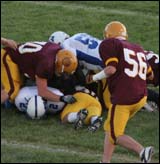 A memorandum opinion of the Ninth Circuit, filed on March 30, 2012, reaches a somewhat paradoxical conclusion. It held that a party that had been indicted for violations of the Arms Export Control Act had no right, even though the indictment was dismissed, for compensation resulting from the destruction of the seized merchandise by U.S. Customs. The merchandise in question consisted of weapons parts imported from Vietnam in violation of the U.S. arms embargo against Vietnam. The opinion pointed out that the goods were still contraband because the claimant did not have a license from ATF required for permanent imports or a license from the Department of State required for temporary imports.
A memorandum opinion of the Ninth Circuit, filed on March 30, 2012, reaches a somewhat paradoxical conclusion. It held that a party that had been indicted for violations of the Arms Export Control Act had no right, even though the indictment was dismissed, for compensation resulting from the destruction of the seized merchandise by U.S. Customs. The merchandise in question consisted of weapons parts imported from Vietnam in violation of the U.S. arms embargo against Vietnam. The opinion pointed out that the goods were still contraband because the claimant did not have a license from ATF required for permanent imports or a license from the Department of State required for temporary imports.
Of course, the back story — why were the indictments dismissed for the illegal arms import? — is the most interesting part of this story and can be found in the district court opinion dismissing the arms charges. The charges in question were dismissed because the court found that the defendant (and claimant) had been denied his Sixth Amendment right to a speedy trial. That happened because — get this — U.S. Customs destroyed the central evidence in the case, the seized weapons parts, because it was costing too much to store them. Repeated calls by Customs to the AUSA prosecuting the case weren’t returned and so Customs simply torched the goods. The prosecution was somewhat loathe to reveal this blunder to the defense and so it kept dawdling on complying with the defendant’s discovery request. Interestingly, the district court held that the destruction of the evidence, although that constituted “gross negligence” by the government, did not violate the defendant’s rights under the Due Process Clause because the evidence was not exculpatory.
My favorite part of the district court decision is this little nugget explaining how the evidence wound up being destroyed:
SA Bench followed SA King’s suggestion and made several telephone calls to AUSA Schaeffer at the San Francisco United States Attorney’s Office, leaving voicemail messages, asking for return calls, and stating that unless he (Schaefer) authorized continued retention of the evidence, [Customs] would destroy it. At SA Bench’s request, his Group Supervisor Jerry Barnett also called one or two times and left the same voicemail messages for AUSA Schaefer. … AUSA Schaefer testified that he never received the voicemail messages, that he always returned his telephone calls and that he had no information that the weapons parts were in jeopardy of being destroyed. Numerous present and former government employees, however, testified that Schaefer had an extremely poor reputation for returning phone calls. SA Bench did not receive any return call from AUSA Schaefer and Bench advised Ms. Mower in July of 1999 that the evidence could be destroyed, which occurred on September 28, 1999. …
AUSA Schaefer had a reputation among law enforcement agents, defense attorneys and members of the United States Attorney’s Office in San Francisco, for extreme dereliction regarding returning telephone calls. SA Stoltz testified that when he wanted to contact Schaefer, it would typically require 50-60 calls and voicemail messages
[Record citations omitted.]
The amazing thing here is that someone would actually leave 50-60 messages in such a situation. I think that’s often referred to as the triumph of hope over experience.
 This blog reported on March 29 that OFAC had provided guidance on various technologies eligible for export to Iran as incidental to the exchange of personal communication over the Internet. Most significantly, OFAC indicated a willingness to permit certain fee-based services, such as Skype and Google Voice, to Iranians under this exception. I had suggested that given comprehensive sanctions on major Iranian banks, ordinary Iranian citizens would be hard-pressed to actually pay for these services even if licensed.
This blog reported on March 29 that OFAC had provided guidance on various technologies eligible for export to Iran as incidental to the exchange of personal communication over the Internet. Most significantly, OFAC indicated a willingness to permit certain fee-based services, such as Skype and Google Voice, to Iranians under this exception. I had suggested that given comprehensive sanctions on major Iranian banks, ordinary Iranian citizens would be hard-pressed to actually pay for these services even if licensed.
 Posted by
Posted by  Category:
Category: 

 A
A  Back when the Bureau of Industry and Security (“BIS”) was begging Congress to give it authority to increase the amount of penalties it could impose, it said that higher penalties would avoid the need for creative charging letters which allege that a single action constitutes four, five, six or more separate violations. For a while, BIS
Back when the Bureau of Industry and Security (“BIS”) was begging Congress to give it authority to increase the amount of penalties it could impose, it said that higher penalties would avoid the need for creative charging letters which allege that a single action constitutes four, five, six or more separate violations. For a while, BIS  A number of news reports, like
A number of news reports, like 

